- 18th December, 2023
- By Denise Choong
Keyword Analysis Demystified: Techniques for Identifying High-Value Keywords in Your Industry

A killer website is one that attracts customers who are genuinely interested in your product or service. To build your website with high-quality leads, SEO and keywords are some of the best tools in your arsenal.
Search Engine Optimisation (SEO) is the art of optimising your website so potential customers can easily find it on search engines (i.e. Google, Bing, Yahoo). There are many elements that improve your SEO, but adding high-quality keywords to your website is the most important of them.
Quality keywords can only be found with thorough keyword analysis. In this blog article, we’ll discuss the meaning of keywords, how to get started with keyword analysis, and suggest several keyword analysis tools you can use.
What are keywords?
Keywords are the specific phrases and words website users type into search engines when finding information on a topic. In the SEO context, adding these phrases and words to your website will help it stay visible when customers search for a product or service you offer.
Keywords can be classified into short-tail and long-tail keywords. Short-tail keywords consist of one or two words, while long-tail keywords can be three, six, or even more words. Here are some examples.
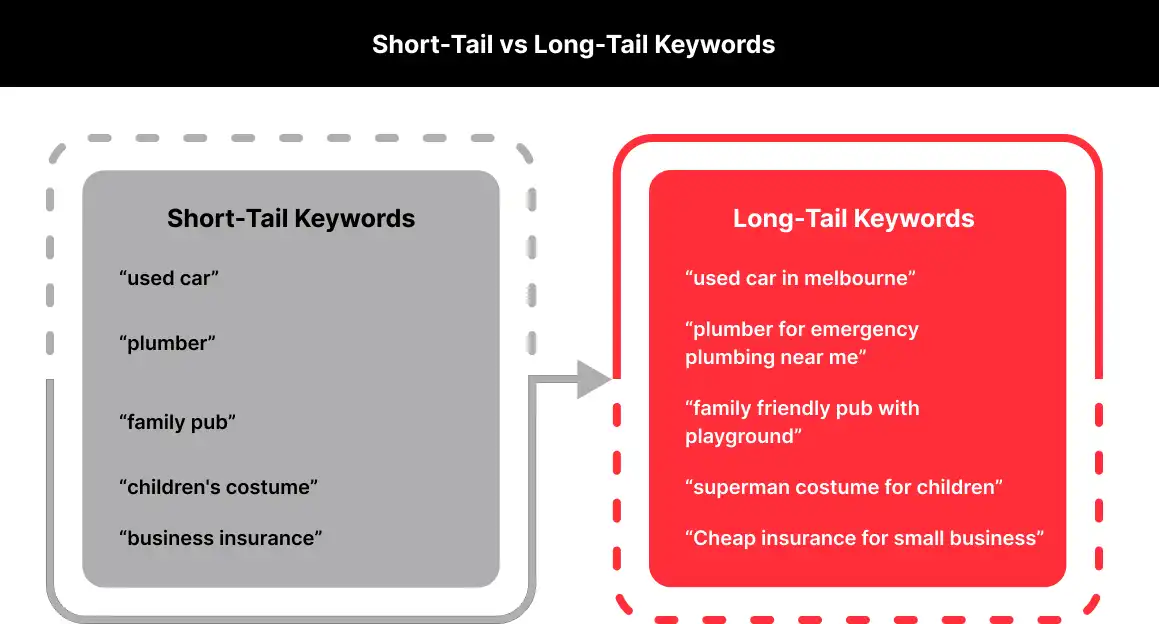
Website users typically search with long-tail keywords if they are looking for specific results. Meanwhile, short-tail keywords are used when searching for more general information. How you structure your website keywords should account for this.
What is keyword analysis?
Keyword analysis is the process of evaluating the keywords used in your website’s content to increase its ranking on a SERP (Search Engine Results Page). With keyword analysis, you can answer questions about your keywords, such as:
Which keyword is right for my business?
Are these keywords relevant to my customer’s search queries?
Can it improve my position on a SERP?
What is the search volume for this keyword?
How difficult is it to rank for this keyword?
Does this keyword match my website goal?
When analysing keywords on a SERP (Search Engine Results Page), Google is the search engine you’ll want to target. It is the biggest search engine in the market - accounting for over 90% of online searches. You’d want to be in the top 3 positions for the keyword you’re targeting in order to get customers to notice you (and this excludes sponsored posts).
Google is constantly changing its search algorithm, which makes SEO a long game that requires a lot of time and skills. One of its latest updates in search is using generative AI, which displays search queries in multiple formats on a page. This is expected to roll out globally in the coming years, making keywords more critical than ever.
Why is keyword analysis important?
Keyword analysis can improve your website in many ways. Here are some of the biggest benefits:
Ensures your SEO efforts are tactically done with maximum results
Increases your rankings on search engines and builds your brand awareness
Increases your website traffic with buyers who are already interested in your product or service
Improve website conversion rates
Gain a better understanding of your customer persona
Keep up with market trends and insights
Overall improvement of ROI and sales
You should identify keywords using the right keyword analysis tools to reap these benefits. Here’s a step-by-step guide on how to do it.
How to identify the right keywords for your industry
Step 1: Analysing your target audience
Many businesses skip this step, but it’s a critical one that’ll help you build an effective keyword strategy. SEO shouldn’t be just about stuffing your website with popular keywords. Rather, it’s about understanding what your audience is looking for exactly, tailoring your content, and showing how your business can solve the issue.
For example, a user searching for ‘how to fix a car that won’t start’ is completely different from ‘best car battery jump starters”. One is looking for information, and the other is looking to buy. Knowing at which stage your consumers are will help you improve your website ranking and conversion.
Step 2: Using the right keyword analysis tools
There are many keyword analysis tools that can help you search for keywords, understand its difficulty and volume, and even assess your competitor’s keyword strategy.
After decades of working to improve our clients’ SEO, we understand the tools that work. Most keyword analysis tools take search data from Google to give you an accurate outlook of how your individual keywords perform on the search engines.
For example, we use Semrush as our go-to keyword analysis tool. Semrush is great for deep dives into your keyword research, offering traffic and search volume data as well as competitive keyword analysis. Semrush also offers a free version with basic features for businesses that want to explore the tool and its functions.
Other notable tools you can use to get started are Ahrefs, SE Rankings, Moz Keyword Explorer, and Google’s free Keyword Planner.
Step 3: Evaluating keyword relevance and search volume
Does your website contain the keywords that customers search for? Keyword relevance is how search engines assess whether your website has keywords that match search queries and if your content is the best resource out there. Your content will only rank high on the SERP if it has the keyword and provides value to the user.
On the other hand, there’s little value in ranking high on a search engine when no one searches for it. Your keyword search volume will help you determine if your selected keyword has a good amount of searches.
A big mistake businesses make is coming up with multiple keywords and stuffing them all into a page. Instead, you’re better off sticking with one primary keyword with two or more words and build a great website content that supports this. Having a keyword with one single word is not only too broad and difficult to rank for, but it will also bring in the wrong traffic.
For example, if you operate a building and construction company, trying to rank on the first page of Google for the keyword “builder” might not be the best strategy. Try using keywords like “commercial builder” or “luxury home builder” for more targeted website visitors.
Step 4: Looking at search intent
Understanding search intent, or ‘user intent’ is another important part of keyword analysis that’ll help you rank high on Google’s search engine. Different website users have different purposes when searching online. Are they looking for information? Or do they want to buy?
Typically, there are 4 types of search intent.
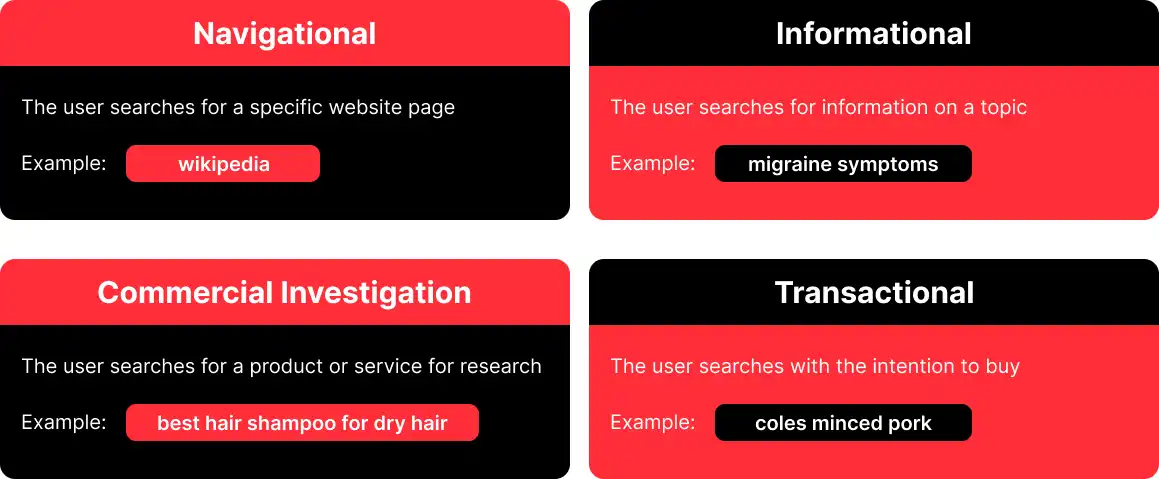
Your website content should be relevant based on your customers' search intent. For example, if your customers are searching for information, you’d want to show them a blog post instead of a product page.
A keyword analysis tool will indicate the user intent of your chosen keyword
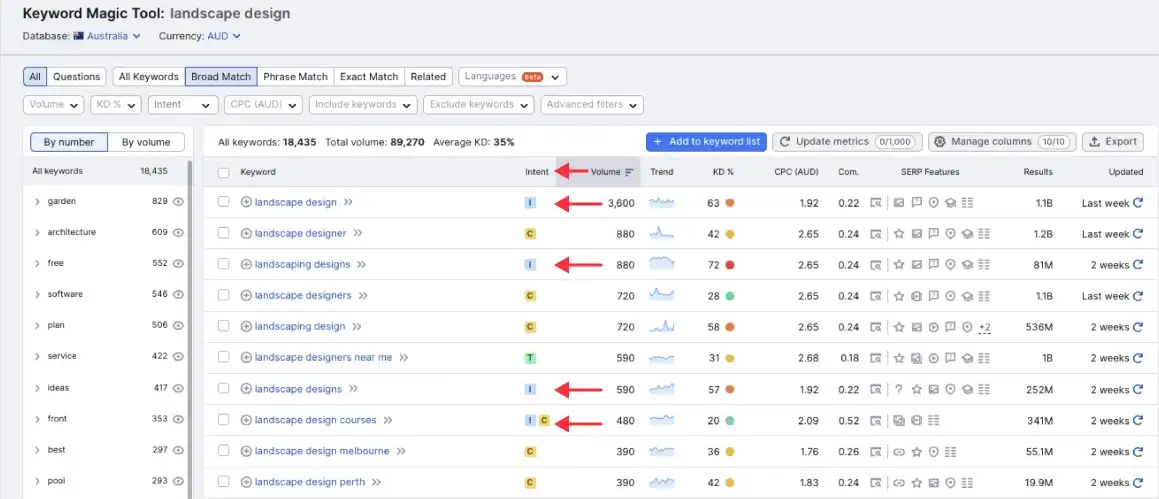
Step 5: Assessing keyword difficulty
Keyword difficulty is another factor to consider when identifying your website keywords, and your keyword analysis tool can show you this. If you’re a small business or just getting started with SEO, there are probably many other websites online that have already targeted the keyword you’re thinking of. Trying to compete with these websites is futile and might take a lot of time.
Try looking for alternate keywords with lower levels of difficulty for your website. If you are a mortgage broker, for example, there’s little point in going for the keyword “home loan” because bigger banks' websites have too much authority (website’s keyword strength) in this term. Consider instead terms like “single parent home loan”, which might be better if that’s your niche.
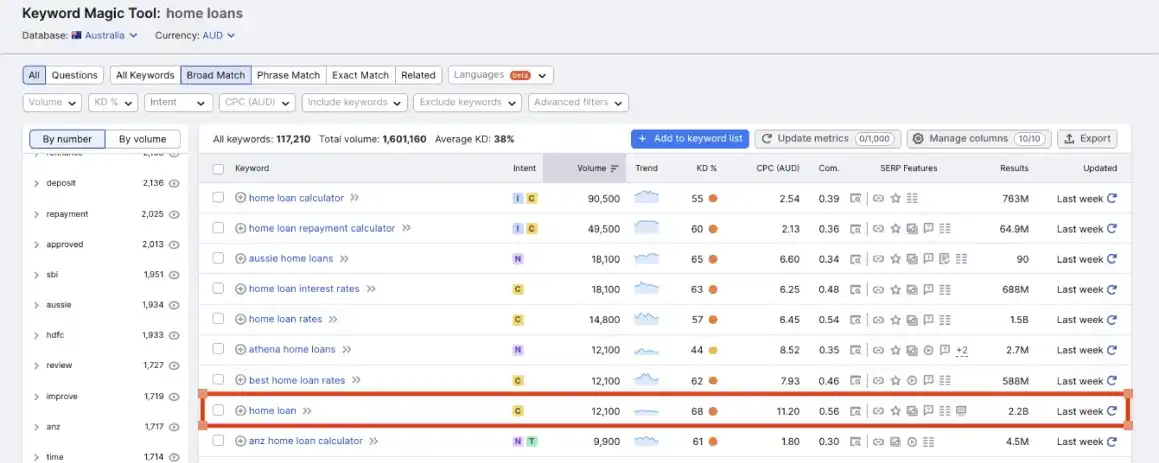
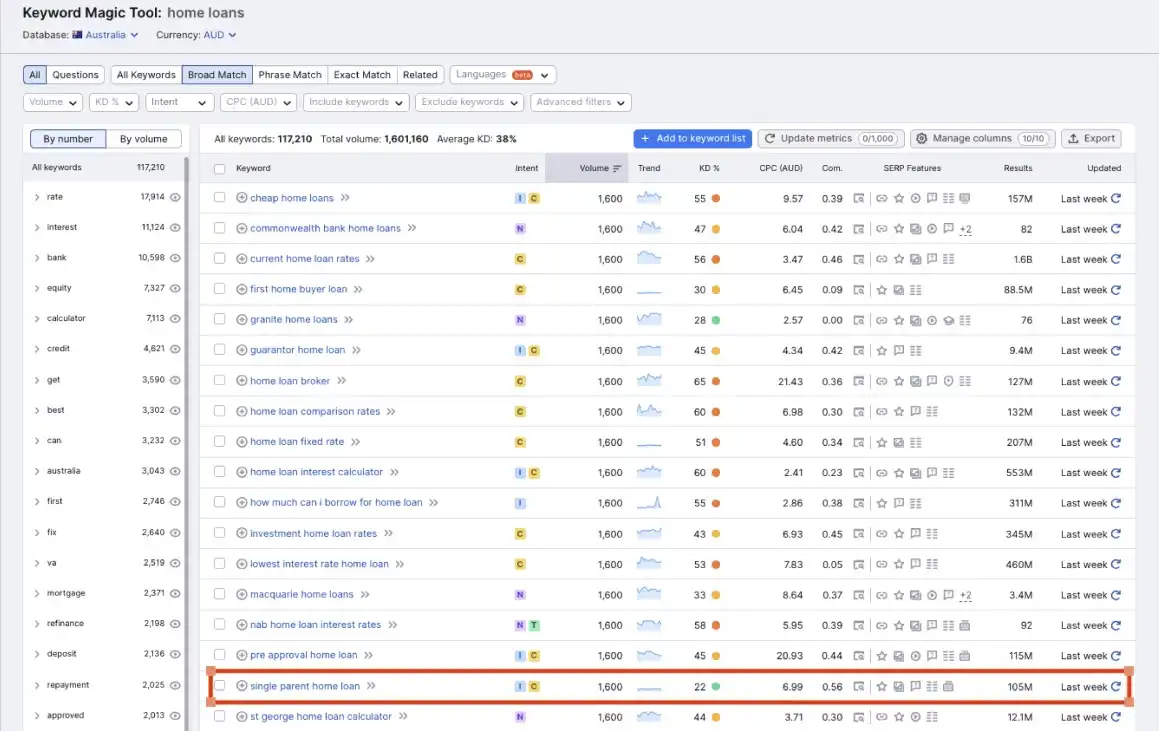
Step 6: Doing competitor keyword analysis
To improve your website ranking, you’ll need to identify what keywords your competitors use online and create a successful keyword strategy that outranks your competitors.
Competitor keyword analysis helps you understand how businesses in your industry use the relevant keywords. To get started, type in your chosen keyword on Google and look at the top 3 non-paid results. What is their content strategy like? Where and how often do the keywords appear on the page?
Using this information, you can choose to compete directly with these businesses using the same keywords or choose a keyword with less difficulty.
Step 7: Looking at keyword trends and seasonality
Your consumers may be increasing their online search for some keywords during certain times of the year - think “christmas fairy lights” and “melbourne cup outfits.”

Seasonal festivals and sudden trends (i.e. COVID-19) significantly impact searches, and a good strategy is to have your website match those keywords when they’re relevant. Consider analysing your target audience searches during the year and monitor for any trends. You can then change your existing keywords or create a new page on your website specifically for it.
Tools like Google Trends, BuzzSumo, and AnswerThePublic are great tools that can help you search for trending keywords and see previous searches that were popular.
Key takeaway
Keyword analysis is a multi-step process that requires precision and skills. By understanding your consumers, evaluating your keywords, and performing a competitor keyword analysis, your business can demystify keywords and master your website content.
Keyword analysis is just the beginning of SEO. If you’re looking for a team that can simplify all things SEO and get you on the first page of Google - send your mission to Digital Assassin.
Digital Assassin provides affordable web development plans for Australian businesses to build and manage their website with ongoing tactical content and SEO best practices. To learn more about how to build a great website, read our eBook, So You Need a Killer Website. Alternatively, speak to an assassin today.